Do you pay for internet speeds >50Mbps? >100Mbps? You could be saving over $50/month just by reading this post. Save your money, you don’t need an internet plan higher than 50Mbps. Chances are, you just need to get a better Wireless Router or if you are lucky, you may just need to better locate your router.
I was inspired to write this because I have found that many people don’t really know how fast of internet they actually need. I have heard the following arguments for upgrading or needing faster internet speeds:
- I take a lot of Zoom work calls at home and need to ensure the best quality for my calls
- My roommates and I are all working from home now (due to COVID-19) and we want to make sure we can all work effectively from home
- My Smart TV lags when I click on the menu or is slow to even load the Youtube Thumbnails
- I just bought a 4K TV and I want to be able to stream 4K movies
- My family complains about how slow the internet is
- And the list goes on..
As it turns out, none of these usually require you to have faster internet speeds and the perceived or real problem lies somewhere else. If I were a betting man, I would solve most of the above with just getting a better Wireless Router/Access Point. 99% of the time, your internet provider can do all of the above with <50Mbps plans.
Do you pay for a 1 Gbps plan? Please comment below or send me a message to help me understand the use cases for this speed. I mean, it does sound cool to mention casually in conversation but I can’t think of what it can it be used for.
When signing up for an internet plan, often times companies will ask you questions about how many devices you have connected to the internet, what do you do on the internet? etc. These “sales” calculators are not doing you any favors and I would *not* recommend using their recommendation as they are often laughable on what they recommend.
Let’s take a look at what real world use cases require for download speeds.
Download Speeds for Popular Use Cases
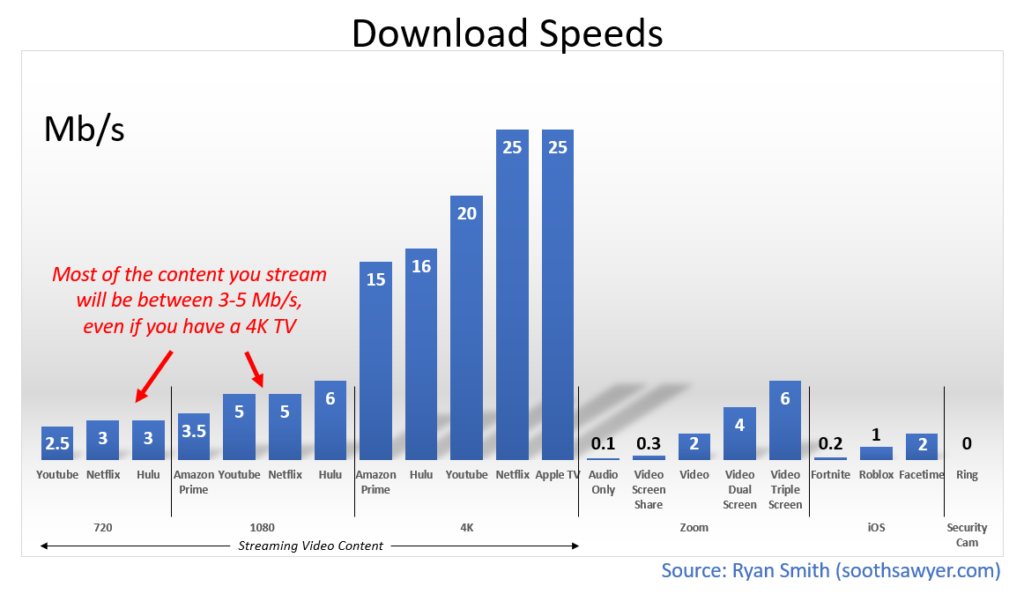
Click here to enlarge the above image
As you can see, the max download speed required by any application is 4K streaming TV with 25 Mbps.. and in the real world 4K streams end up being <20 Mbps.
As it turns out, most of the content you stream on your TV, PC, or phone is 1080p or less and therefore requires <10Mbps per stream, even if the content says it is available in 4K.
And that Zoom call? It only takes 2Mbps. Yeah, that’s it. Unless you are doing dual or triple full screen Zoom calls where you fill all your monitors with streams of other people (I have never seen anyone do this). But if you are one of those rare people that even knew you could do this, this would take up a max of 6Mbps. This is about the same as one 1080p Netflix stream. Please do not upgrade your internet plan to get better Zoom calls. It won’t make a difference.
Your kids like gaming? Guess what, the bandwidth requirements for gaming are not that high. In fact, gaming is more often critical of latency speeds (a whole other conversation) which are the same between all of the plans by internet providers. So, you getting that 1Gbps plan for your Xbox-addicted son? It doesn’t help him at all. Well, there is one use case where it will help him: When he downloads those enormous game updates before he can start the game, they may go slightly faster.
Note: I looked up all the bandwidth (speed) requirements on each of the respective services mentioned, as well as monitored my own router as I tried using each of those services to validate the actual speed usage.
Do you watch YouTube on Apple devices?
I didn’t realize this until recently, but all YouTube videos played on any Apple device (e.g., iPhone, iPad, Apple TV) have a max resolution of 1080p; This is due to an incompatibility in codecs for higher resolutions (H.265 [royalty-based] vs VP9 [royalty-free]) so all YouTube is downgraded to H.264 w/ 1080p max resolution on all Apple devices; even if the video says “4K” in the title or description.
This should get resolved with the AV1 (royalty-free) codec that has been slowly rolling out to major streaming services and Apple seems to be on board with it. If you didn’t follow any of this tech speak, the gist is that you don’t get 4K YouTube content on any Apple devices today. You likely will, after Apple puts AV1 algorithms into their chipsets to allow for hardware acceleration.. maybe the iPhone 12?
Upload Speeds for Popular Use Cases
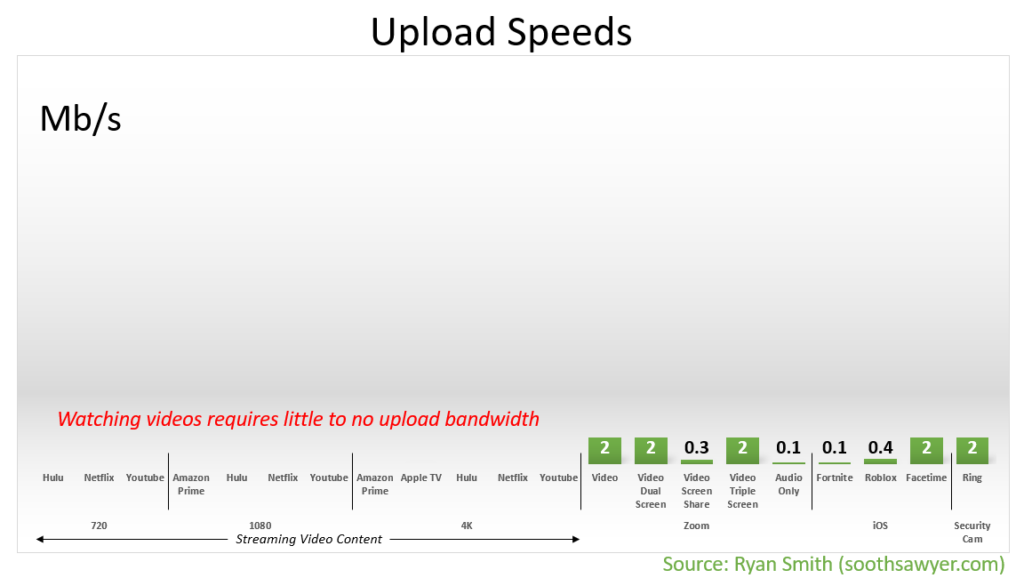
Click here to enlarge the above image
Let’s now look at upload speeds; This is your household sending data *to* the internet (e.g., you turning on your video on a Zoom call, you Facetiming) .. whereas download speeds are referring to you getting data *from* the internet (e.g., watching YouTube, Netflix, viewing someone on Zoom not including sharing your webcam).
I know the bars in the graph are small but I left the scale in the chart above the same as the download speeds graph (the blue chart above) to prove a point: You don’t really need too much upload speed. Most internet providers actually make it quite difficult to find out what their upload speeds are for their plans and only market/sell you on download speeds (e.g., 50Mbps, 100Mbps, 1Gbps).
The best use case for needing upload speeds are for *video* Zoom calls, Apple Facetime, Skype calls, Ring Security Cameras, or for any type of video you are *sending* to the internet.
In general, it takes about 2Mbps of upload speed per video you are streaming (sending) to the outside world (e.g., to your family member, to Ring’s cloud video storage, to your coworker on Zoom).
Remember that upload speeds do not consume any of your *download* speeds. And often times, your download speeds are far higher than your upload speeds, as I will cover in just a bit.
Let’s take a look at a family of 5 using the internet at the same time
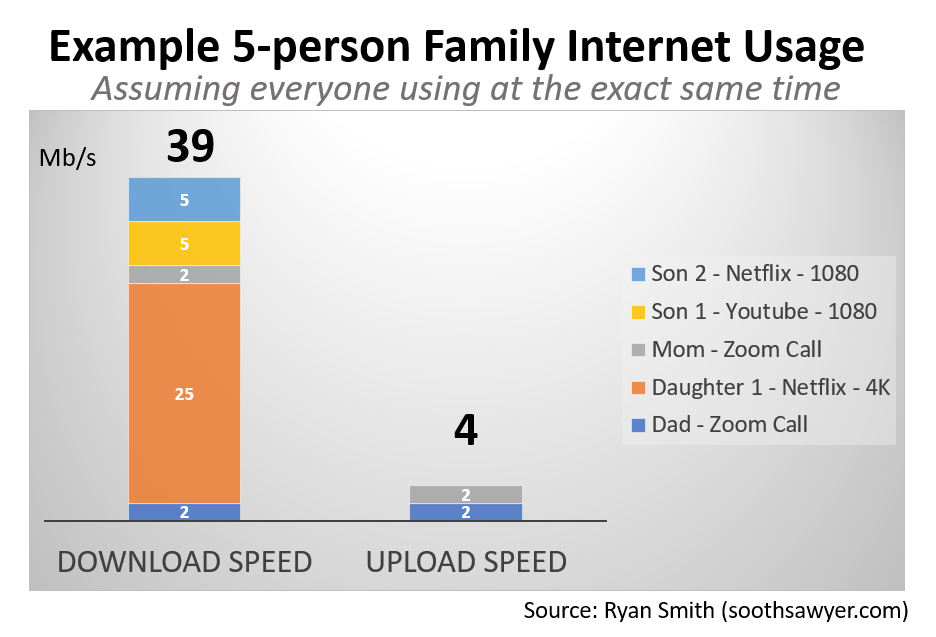
This is a hypothetical family of five that loves to all use the internet at the same time, on each of their own devices. The parents are both working and each are doing Zoom video calls for work, their three kids are watching TV (Netflix 1080p, Youtube 1080p, Netflix 4K) in their own individual rooms. I’m not sure what the daughter is watching in 4K..maybe a documentary on animals? 🙂
In any event, even with this very heavy internet active family, they are only using around 40Mbps at any given moment. Wow… Five people all doing heavy video-related activities and they don’t even need anything higher than 50Mbps. And this assumes they are all doing these at the exact same time. Why did the nice Comcast man tell me I needed 200Mbps? I have absolutely no idea. Well, I do. It’s to make more money off of you. 🙂
The one thing I would be mildly worried about here is the upload speed. Comcast/Xfinity typically has 5Mbps upload speeds with many of their plans. If this family had someone come to their front door while both parents were on Zoom video calls, and their Ring doorbell started to send video to the internet, that would put them above their plan at 6Mbps (2+2+2) so their coworkers viewing this mom and dad’s Zoom camera feed may see some degradation in the video for a short moment.
If you have a scenario where you may have multiple video feeds you are sending *out* simultaneously from your house, you may need to pay attention to your upload offerings from your internet service provider.
Here are some example plans from Comcast and AT&T:
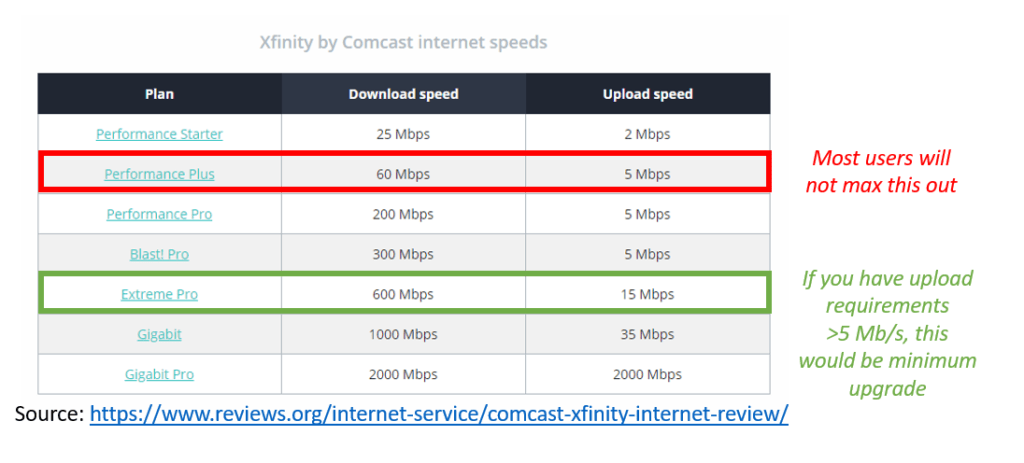

For 99% of users (you and me), I would recommend the “Performance Plus” at 60Mbps download and 5Mbps upload from Xfinity and the “AT&T Internet up to 100Mbps” at 100Mbps download and 20Mbps upload from AT&T. If you get anything higher than that, you will *not* notice a difference.
If you were one of those people that may be sending out multiple video feeds *simultaneously*, I would opt for the AT&T 100Mbps plan (because it offers the 20Mbps upload vs the 5Mbps from Comcast).
You will not notice any difference in your internet speeds by paying for higher than you need.
If you want to improve your internet speeds at home, just upgrade your Wireless Router
I am willing to bet that if you have ever complained about internet speeds or slow buffering of video, it is not actually your internet that is the problem. It is likely your home Wireless Router. Chances are you opted to take the “free” (often $10/mo from your Internet Provider) since it just works. However, this [default] choice is probably what is causing your internet woes.
I would recommend getting a wireless mesh like Amazon Eero for $199 or Google Nest WiFi at $269. Or getting a stronger WiFi router like Netgear Nighthawk AX8 at $380 or even Netgear Nighthawk AX4 at $140. If you are buying a new Wireless Router I would recommend going with a “Wifi 6” version (note: many of the mesh routers are still not Wifi 6) since this is the new standard going forward and will help your router to have a fighting chance to keep up with your growing number of devices connecting to WiFi. Not only does Wifi 6 help get faster wireless speeds, it also helps you connect more devices without overwhelming your router.
Worried about the high price tag? Downgrade your internet plan to anything above 50Mbps and take the money you are saving per month and put that towards your new router. You should get your money back within a few months. If you save $50/mo over 40 years (your working life), that would result in over $100K in savings (assuming a 6% return).
Bonus tip: If you are renting your cable modem from your internet provider, stop. They charge you $10/mo and you can buy a nice modem like Netgear CM700 for $100 (payback is only 10 months; this model does not work with AT&T) that supports up to 500Mbps. Just make sure you buy a modem that works with your internet provider.
You may only need to relocate your wireless router
Although a better router (stronger signals, or multiple signals using a mesh) would do the trick, you may get away with just relocating your router. Sometimes this isn’t an option due to where your cable modem is located.
The key to finding where the best placement of your router is, is to understand how strong the WiFi signal is in different parts of your house. And unfortunately, this is an entirely new topic that will require a more in depth post.
I will try to write up a post on how to check your Wireless Router speeds throughout your house, using just your phone. I actually used this method to demonstrate everything I told you in this post when a family member wanted to upgrade their 200Mbps plan because they had “bad internet speeds”. We discovered in parts of their house they were only getting 1Mbps!!!! Hint: it was solved by moving them from their “free” router to a mesh router. When I finish that guide, I will replace this sentence with a link to that post.
Any questions or comments?
If you have any questions on anything I wrote or if you have a use case that will invalidate this post, just post in the comments below.

I have been around IT since I was in high school (running a customized BBS, and hacking) and am not the typical person that finds one area of interest at work; I have designed databases, automated IT processes, written code at the driver level and all the way up to the GUI level, ran an international software engineering team, started an e-commerce business that generated over $1M, ran a $5B product marketing team for one of the largest semiconductor players in the world, traveled as a sales engineer for the largest storage OEM in the world, researched and developed strategy for one of the top 5 enterprise storage providers, and traveled around the world helping various companies make investment decisions in startups. I also am extremely passionate about uncovering insights from any data set. I just like to have fun by making a notable difference, influencing others, and to work with smart people.

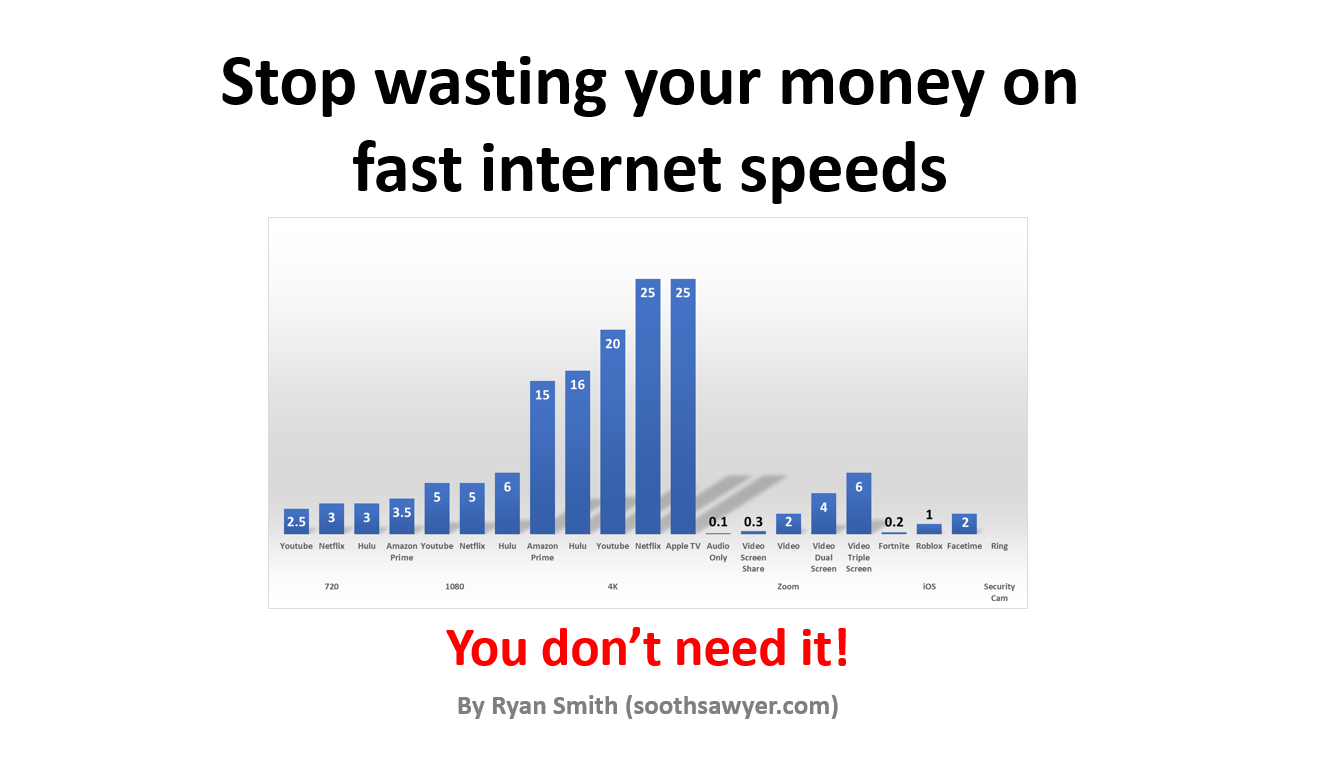
It seems that since high speed is the rage, all the internet companies have upgraded and are charging customers accordingly. I live alone; my needs are very small, yet I am forced to pay prices I frankly can’t afford. Here’s an idea…why doesn’t someone start a company with slow speeds and low prices? Economy style! (I’m not on assistance; evidently there are lower rates for those (forced to) willing to disclose SSN and passport #’s!)
What if I’m streaming using an iptv service? I’ve heard they require higher speeds due to the servers the content comes from not being as robust as say Netflix. I’m actually getting ready to move and xfinity is all thats available. Had planned on getting the 1Gbps service, but now im rethinking. They want to charge me $24 extra a month for their router so I can get unlimited data. Is that something I need, or could I still get that same data with my own router? Thanks for any advice
I would guess most streaming services will be around 5Mb/s. In other words, it will be the 1080p type stream. If you have a service where you will somehow be getting a ton of 4K content, plan on 20-25Mb/s per concurrent show/movie you are watching. Add up how many concurrent shows are watched in your household and times that by the 1080 or 4K number. Then add some room of 10Mbps for other stuff like Zoom streams, etc and that should give you your number. Regarding Comcast.. they unfortunately have data caps (when I last looked it was 1.2TB/mo). You should be able to look at your past usage over time to see where you fall with them. I never passed up that number until my entire family was home doing zoom calls all day, and I was using a VDI solution (streaming a PC screen over the internet using roughly 3-50Mbps depending on whats going on). I barely went over the 1.2TB but I think it had to do with the bandwidth hog of the VDI solution I was trying out. Otherwise, I would not have gone over. I hope this helps. If not, give me more details on your usage and I can calculate it out. I wouldn’t pay more than $70/mo for internet if you can help it.
I live in a data-capped cable-only market, and after our family neared or exceeded the cap, several months in a row, I too started monitoring and logging my local network traffic, through my router.
While I generally found the same results, the one area that sent bandwidth usage through the roof was cloud gaming services, such as Stadia and GeForceNow. GeForceNow, in particular, would constantly pull an average of 30-60Mbps alone, depending on quality settings. Add the typical family usage you mentioned above, and the basic plan just won’t cut it for us, unfortunately.
Hell, if we want to consider cloud gaming in the future, which next gen consoles are now planning to facilitate, then I feel that bandwidth will definitely become a factor. That aside, I am so frustrated by my local market, as our family has to either budget our entertainment choices (as cutting work and school are not an option), or face paying extra fees to go “truly” unlimited.
Yes, data caps is definitely something to consider. This differs from bandwidth that I discussed in this article. Cloud gaming or PCs will definitely be something that drives bandwidth as well and can range between 2Mbps and 70Mbps depending on what’s going on at any moment. I did not cover this use case and as you pointed out, this would drive you to need a 100Mbps plan to accommodate cloud gaming and everything else I covered in the post. Thanks for your feedback.
I’m a content creator via twitch, and make a bit of a living off the platform, unfortunately I’m required to need about 35 Mb upload which is only provided via the Gigabit plan since they data cap all their uploads behind their paywall
I’m a network engineer by trade, and a lot of what you’re saying is true. Unfortunately, it only applies to “most” users which sparingly stream and work from home. I feel Comcast’s “95% of users will not hit their cap” statement is skewed in some form.
I live in a house with my wife and 3 kids. We only have a cable internet connection (no tv service) and we were notified of reaching the cap. Out history showed that we reached nearly 3tb or over each month since the pandemic started.
I have 1G service, and purchased it because I like to not hit my bandwidth limit and start dropping packets. Having at least 20% free bandwidth is nice, and I’ve only oversubscribed a few times.
There are a few things that happen with docsis 3.1 that make a bit of a difference, and though you CAN run slower with it, it’s usually not offered until you’re bumped up to 200+ on a new circuit. If you have “okay” connectivity and things are sluggish, they’re obviously going to check the node and stuff around your home first. The cleanliness of docsis 3 doesn’t need to be as tight as it does with the newer 3.1, so they let a little loss slide and it’s passed off. Once you move up, they have to really ensure the line is clean or the device will not even register in their system, and will show a fault. So, moving to something significantly faster in a lot of cases will change your connection to something you didn’t know was possible.
Depending on latency, though.. people may not ever hit the advertised speed they’re paying for, and in that case the cascading loss will be felt when down into the lower packages. Moving up will bring them a bit higher, though still not as advertised.
In our house, they download games constantly. Modern warfare itself is 200gb. We have 8 consoles and 2 computers as well as smart TVs and streaming dongles. We obviously don’t use them all at once, but even so, this is becoming more and more popular. Maybe not 8 console popular, but more devices (ring cameras, etc) downloads and streams than ever… Especially right now.
Anyway, rather than suggesting a particular speed for anyone, I tell them to pay for what they feel they want to spend on. One xbox will hit 600mb/s easily with downloads. It’s not vital traffic, but it’s something to consider.
Also, if you’re paying to much, call them. They get away with full price constantly and any sign of unrest and they’ll “find” that special promotion that’s always going on every day.
I’m not arguing with your statements, but I do think it should come with a disclaimer that your area and infrastructure may warrant a much faster connection depending on how many subscribers are in the area (not fiber). Sometimes you’ll see a huge difference by upgrading, and if you’re frustrated to begin with, maybe that’s the way to go.
Our little local tv company has never offers any promotion or money off.. They themselves hijack stations from direct tv, dish and other companies.. Satellite with the largest package is actually way cheaper than our sh*tshow local mess.. Basic cable which is ch 2-22 and 20 digital channels is $50/mo.. Expanded basic is like 30 more channels none being premium.. But Disney, nick and such and it is $113 a month.. If you want digital cable which is the same as the smallest $39 sat package.. Its $150 a month and if you want hbo, max, sho or any other premiums you pay per channel added and its individual channels not all hbos but one hbo or one sho and they are $12 ea channel you add.. Plus you pay $12 per box per room extra to rent their set top boxes dvr is like another $30 per room you want it in… They get away with highway robbery.. But they are the only one available in the whole town and bordering towns close by.. So you pay it or dont have it.. We pay $114 for 50mbps internet from them.. They advertise it as 350 mbps but never get over 50 ever.. Plus we pay $10 extra for the modem ea month.. But they want $30 to give me a new modem capable of getting the speeds they say they give
Hi . Thanks for the post ! How do I check my router speed at different places in the house? I noticed you mentioned doing this. Thank you!
Hi Lisa, In short, I would recommend standing in different locations throughout your house and run a speed test on your phone/laptop in each spot. Note the Ping (ms), Download (Mbps), and Upload (Mbps). Take a reading near your router so you have a theoretical max performance to compare against. If your numbers standing near your router don’t approach the speeds you are paying for then your router may be old or some other configuration issue is going on or the device you are testing it on (your phone/laptop) doesn’t support those higher speeds. You can try turning off and turning back on your router to make sure you are running nice and clean. I prefer the Ookla Speedtest app but use whichever speedtest app you want.
I think this should be updated due to the ever-growing working from home industry, and which Zendesk and other VOIP systems requiring 10+mbps upload to work effectively. As one singular person, I use roughly 1tb of data a month working from home and streaming. This article should be updated for the modern use case
This article was low balling when it came out. There are so many reasons why the data predictions here would be a problem. Seeing the data as its being used is not even the same to establish a connection. Having 1 mbps will cause roblox to throw an error every 5 to 15 minutes. Zoom calls at 2 mbps barely hold audio. Many of my zoom sessions use 6 to 8 mbps with low quality. Watching Netflix at 1080p consumes 10 mbps of my network per device. Netflix at 4k for me consumes 18 to 28 mbps with spikes above 100 mbps. Also, most individuals aren’t using a single device at a time. My kids will have youtube or netlfix streaming while simultaneously playing roblox (people often watch tutorials while playing). I also travel a lot and this seems like consistent usage across many different providers, routers, modems, and networks. Mind you, most of my stuff is hardwired in. Even my dang sleep number bed uses a few 100 kbps a decent amount of the time, add that up to all the other constantly active devices like alexas and smart devices and bandwidth becomes saturated quickly. 100 mbps is constantly being used on my network. We have used 1.6 TB of data this billing period, and there is still 14 days left before the end of this period….
I pay for higher speed because it helps during congestion.
When I moved, I started with the “fast enough for me” plan, of 50mbps/2mpbs. I quickly found that during the afternoon, my internet turned into a buffering piece of junk, streaming movies was impossible. Trying to work from home was frustrating. The cable company checked, no problems with the line, so I had to pay $150 for the service visit. I used TestMy.net for doing automated speed tests. The internet was close to promised speed between midnight and 6am, then it slowed down some 20mpbs/1mpbs, then got bad between 2pm till 10pm, 6mpbs/0.3mbps.
I put up with that for a week, and decided to try paying for faster internet, and bumped up to the 150mbps/3mbps. That was faster, fixed the streaming issues, but still had issues with work meetings during the afternoon. With the automatic speeds tests showing 6am to 2pm getting 50mpbs/1.5mpbs, and between 2pm till 10pm, 15mpbs/1mbps.
So I moved up to the 350mbps/5mbps and got functional speeds finally. Automatic speeds tests showing 6am to 2pm getting 120mpbs/5mpbs, and between 2pm till 10pm slow but still usable, 65mpbs/3mbps.
So, while gigabit isn’t specifically necessary, going on the higher speed tiers allows your internet to still remain at a decent speed when congestion is throtteling everyone.
I stumbled on to your page while researching whether I should upgrade my internet speed and have found it really helpful, so thanks for that. This makes a strong case that even with a family of four with a couple teenagers in the house, I probably don’t need the additional bandwidth. And indeed that has been our experience, having used 100Mbps speeds for a couple years now. We’ve never had an issue, and recently when our provider gave us a free upgrade to 200Mbps (as a pre-emptive strike to retain our business with a new internet provider moving into town), I’m not sure we noticed a difference.
So we don’t need the extra bandwidth, but would we benefit from additional speed? Games and the occasional large file would download faster. Would we notice web pages loading faster? My hunch is probably not, as we don’t see an appreciable difference when going from 100 to 200. But what about 500?
I don’t think you would benefit from the extra speed. Do a speed test from each computer/device (speedtest.net) and see if you are even obtaining the speed you pay for. If not, chances are you don’t have good WiFi coverage throughout your house. Try doing a speedtest on a mobile device near your router/WiFi and see if youget the speed you are paying for. Chances are you are better off spending the extra money buying a newer WiFi 6 router or mesh network. It is unlikely that any single device will be downloading or uploading anything faster than 20Mbps. There are some exceptions to this like cloud gaming where you are streaming a 2-4K stream but most people don’t do that..and if you do, that would likely be around 50-70Mbps. Even when my son is downloading software for Xbox games the max I’ve seen recently is 195Mbps. I do have fast internet at my house but only because the service that offered me no caps on monthly download capacity happens to be a fast internet offering. I was also testing out a concept I had for cloud gaming that was pushing the 50-70Mbps I referred to earlier. I would personally pay attention to getting good ping/download speeds throughut your house and get at least a WiFi 6 router (if you have the extra cash, get a 6E router if you ever plan on getting anything higher than 500Mbps internet speeds in the near future). The WiFi 6 router will handle our modern day households with more devices and should reduce your latency (ping times) that are introduced by your WiFi. I have 6-8ms ping times from device on my WiFi to Google/server on the internet.
Hi Ryan,
In our house we don’t have WiFi, We have wired the router to the modem and 4 devices are wired to the router: a VoIP phone, one smart TV, one PC and (occasionally) one Chromebook.
We watch a lot of sports, Apple TV and YouTube. As far as the PC goes, we usually use it for shopping and internet surfing. Our internet provider is Xfinity and our plan offers speeds up to 800 Mbps but I feel we are throwing money away.
How much internet speed do we really need so everything works smoothly? I agree with another comment that speeds slow down in the afternoon and evening hours.
Thank you.
I genuinely feel you don’t need more than 100Mbps. VoIP phone = 3Mbps (very liberal). Smart TV (assuming 4K) = 20Mbps. Chromebook = 5Mbps (assuming you are streaming 24/7). 55Mbps is all you need.